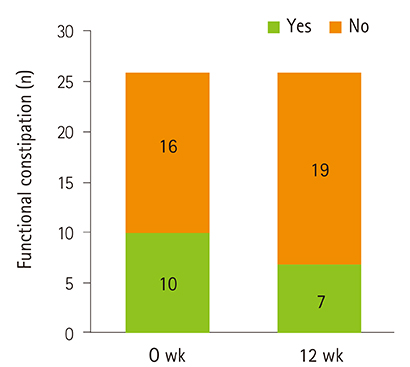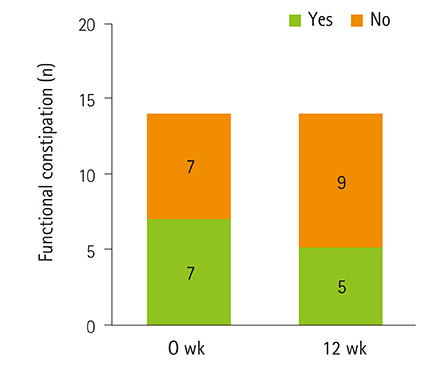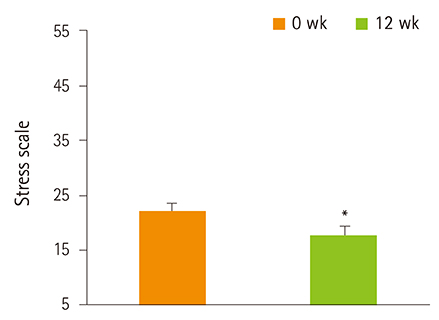Clin Nutr Res.
2016 Apr;5(2):102-111. 10.7762/cnr.2016.5.2.102.
Effects of 12-week Vegetarian Diet on the Nutritional Status, Stress Status and Bowel Habits in Middle School Students and Teachers
- Affiliations
-
- 1Department of Medical Nutrition, Kyung Hee University, Yongin 17104, Korea. ypark@khu.ac.kr
- 2Buksung Middle School, Gwangju 61246, Korea.
- 3Department of Nutrition Education, Gachon University, Seongnam 13120, Korea.
- 4Institute of Medical Nutrition, Kyung Hee University, Seoul 02447, Korea.
- KMID: 2168228
- DOI: http://doi.org/10.7762/cnr.2016.5.2.102
Abstract
- This study investigated the effect of switching normal diet to vegetarian diet rich in vegetables and fruits for school foodservice and home meal on the nutritional status, bowel habit improvement and stress reduction of teachers and adolescents. A total of 40 research subjects (26 students, 14 teachers) from one middle school voluntarily participated in the research. Questionnaire surveys and blood analysis were conducted before and after a 12-week vegetarian diet period. The participants were asked on their dietary habit, bowel habit and stress measurement. After 12 weeks, reduction of BMI (kg/m2) in the students (p < 0.05) and reduction of TC (mg/dL) in both teachers and students (p < 0.05) were observed. Also reduction of LDL-C (mg/dL) was observed in the teachers (p < 0.05) whereas serum calcium and Vitamin B12 was increased in the students and teachers (p < 0.005). The teacher's stress level was reduced (p < 0.05) after the 12-week vegetarian diet. As for the changes in bowel habit, the number of the students and teachers classified as experiencing functional constipation was decreased respectively from 10 to 7, from 7 to 5. Based on the result, it is considered that the vegetarian diet rich in fruits and vegetables improved general health status of study subjects suggesting that such a dietary habit would substantially contribute to improving nutritional status and bowel habit.
MeSH Terms
Figure
Reference
-
1. Koo S, Park K. Dietary behaviors and lifestyle characteristics related to frequent eating out among Korean adults. J Korean Soc Food Sci Nutr. 2013; 42:705–712.
Article2. Kim SH, Cho SW, Hwang SS, Ahn M, Lee D, Kang SW, Park YK. Increased whole grain, fruits and vegetable intake reduced oxidative stress in high school students. Korean J Nutr. 2012; 45:452–461.
Article3. Jung HH. Study of the middle school students' vegetable intake from school-provided meals in Daejeon [master's thesis]. Seoul: Kookmin University;2007.4. Ministry of Health and Welfare, Korea Centers for Disease Control and Prevention. Korea Health Statistics 2013: Korea National Health and Nutrition Examination Survey (KNHANES VI-1) [Internet]. 2014. cited 2015 March 18. Available from https://knhanes.cdc.go.kr/.5. Ministry of Health and Welfare, Korea Centers for Disease Control and Prevention. Korea Health Statistics 2011: Korea National Health and Nutrition Examination Survey (KNHANES V-2) [Internet]. 2012. cited 2015 March 18. Available from http://knhanes.cdc.go.kr/.6. Alexander DD, Weed DL, Miller PE, Mohamed MA. Red meat and colorectal cancer: a quantitative update on the state of the epidemiologic science. J Am Coll Nutr. 2015; 34:521–543.
Article7. Kim HY. Effects of a brown rice and vegetable diet on the defecation conditions and health status of high school students. J Korean Public Health Nurs. 2013; 27:179–189.
Article8. World Health Organization. Food and Agriculture Organization of the United Nations. Fruit and vegetables for health: report of a joint FAO/WHO workshop,1-3 September 2004, Kobe, Japan. 2004. cited 2015 December 18. Available from: http://www.who.int/dietphysicalactivity/publications/fruit_vegetables_report.pdf.9. Cho JH, Kim MK, Kim SH, Cho SW, Park YK. Association between hair mineral content and nutritional status in vegetarians and non-vegetarians. Korean J Nutr. 2011; 44:203–211.
Article10. Kim GR, Kim MJ. A survey on the dietary behavior of high school students: about regularity of meal and number of meal per day. J Korean Soc Food Sci Nutr. 2011; 40:183–195.
Article11. Hong JH, Cho MS. Acceptance of vegetable menus of a school lunch program by high school students in Seoul and its association with health and dietary behavioral factors. Korean J Food Sci Technol. 2012; 44:121–134.
Article12. Longstreth GF, Thompson WG, Chey WD, Houghton LA, Mearin F, Spiller RC. Functional bowel disorders. Gastroenterology. 2006; 130:1480–1491.
Article13. Lee KJ. Stress, social support, and behavior problems of adolescents [doctor's thesis]. Gwangju: Chonnam National University;1997.14. Cohen S, Kamarck T, Mermelstein R. A global measure of perceived stress. J Health Soc Behav. 1983; 24:385–396.
Article15. Cha BK. A comparative study of relationships among eating behavior, intake frequency of food group and cardiovascular disease related factors in vegetarians and non-vegetarians. J Korean Soc Food Sci Nutr. 2001; 30:183–192.16. Korean Society of Lipidology and Atherosclerosis. 2014. cited 2015 March 18. Available from http://www.lipid.or.kr.17. Sung MK, Kim KM, Kim MB. A study on the calcium and iron status of female vegetarian college students. Korean J Community Nutr. 1998; 3:767–775.18. Pawlak R, Parrott SJ, Raj S, Cullum-Dugan D, Lucus D. How prevalent is vitamin B(12) deficiency among vegetarians? Nutr Rev. 2013; 71:110–117.
Article19. Watanabe F, Yabuta Y, Bito T, Teng F. Vitamin B12-containing plant food sources for vegetarians. Nutrients. 2014; 6:1861–1873.
Article20. Lee GY. A comparison of stress levels of middle school students by grade. J Korean Soc Sch Health. 2011; 24:190–198.21. Park H, Cho S, Koo JO. Effect of a diet program for adult women on body weight loss and health related indices. Korean J Community Nutr. 2013; 18:599–610.
Article
- Full Text Links
- Actions
-
Cited
- CITED
-
- Close
- Share
- Similar articles
-
- Differences between the Food and Nutrient Composition of the Vegetarian and Non-vegetarian Menus of Elementary School Foodservices in Chungnam
- Smoking Status and Dietary Habits of Middle School Students
- Prediction of Perceived Health Status on Job Stress and Family Stress with Middle School Teachers
- A Study for Comparison of Dietary Quality and Vitamin K Intake of Vegetarians with Carnivores
- Association between Stress and Nutritional status of High School Students in Chungbuk using Nutrition Quotient for Korean Adolescents





